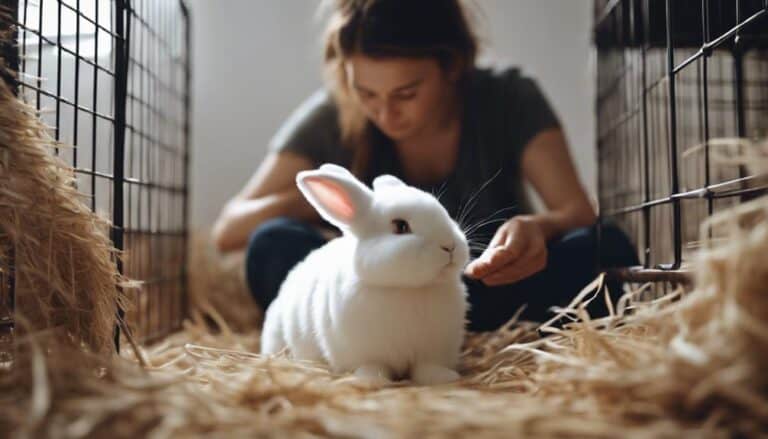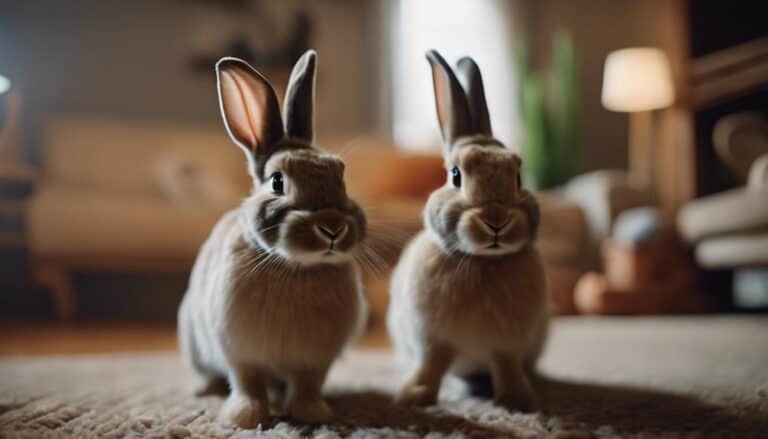So you're thinking about why you hurt your pet when you were a kid? Those memories can be pretty confusing, guilt-tripping, and curiosity-piquing, right?
You might be wondering what drove you to do something like that to an animal you supposedly cared about. Let's face it, hurting a pet is a pretty significant thing, and it can say a lot about what was going on in your life back then.
Maybe you're looking for some answers about why you did what you did. What were you thinking? Were you mad, scared, or just plain curious? It's possible that exploring what led you to hurt your pet can help you understand a pretty important part of your own development.
What was going on in your life that made you act out like that? Was it a one-time thing, or was it a pattern of behavior?
Contents
Key Takeaways
So, you're wondering why you might have hurt your pet when you were a young child? Well, there are a few reasons why this might have happened.
For one, when we're really young – under the age of 5 – we might not understand that our actions can hurt our pets. We're curious and we don't mean to cause harm, but we just don't know any better.
Another reason is that we might not be able to connect with our pet's feelings yet. We don't realize that they can feel pain, fear, or sadness, just like we do. This makes it hard for us to develop empathy towards them.
You might also have seen some pretty rough stuff on TV or in movies when you were a kid. Sometimes, we might imitate what we see, even if it's not a good thing to do. This can lead to us treating our pets badly without even realizing it.
The good news is that there are ways to prevent this from happening. If we have proper guidance and education, we can learn how to treat our pets with kindness and respect. We need to learn what's okay and what's not okay to do to them.
As we grow up, it's important to develop empathy towards our pets. We need to understand how they feel, ask for help when we need it, and think about how our actions affect them. By doing this, we can become more compassionate and caring towards our furry friends.
Lack of Understanding Consequences
If you don't understand how your actions affect your pet, you might accidentally hurt them.
As a kid, it's really important to get that hurting animals can have serious consequences. Your pet feels pain just like you do, and they count on you to take care of them and keep them safe. When you hurt them, they don't get why someone they trust is causing them pain.
So, it's super important to understand how what you do affects your pet.
They might start to get scared, worried, or even get physically hurt. If you don't get that you're causing pain, it can have long-term effects on your pet's well-being and your relationship with them.
If you notice yourself or someone else hurting animals, you need to get help right away. If you deal with the problem early, you can stop more harm from happening and learn to treat your pet with love and respect.
Imitating Behaviors Seen in Media
Watching TV or movies can really shape how you interact with your pet. When you're a kid, you're like a sponge, soaking up all the information around you. If you've seen people being mean or violent on TV, it might affect how you treat your pet. Experts who work with kids say it's super important to keep an eye on what they're watching, because they're really impressionable at a young age.
The behaviors you imitate from media can have a big impact on your pet. For example, if you're aggressive towards your pet, it can make them feel scared and anxious. If you handle them roughly, it can even hurt them physically. And if you yell at them, it can cause emotional distress.
Here's a breakdown of what can happen and what you can do about it:
| Imitated Behaviors | Impact on Pet | Recommendations |
|---|---|---|
| Aggression towards pet | Fear and anxiety | Seek guidance from a child psychologist to learn how to manage your emotions and treat your pet with kindness. |
| Rough handling | Physical harm | Learn about proper pet care and handling from a trusted adult, like a parent or teacher. |
| Yelling at pet | Emotional distress | Practice positive reinforcement techniques, like rewarding good behavior with treats and praise, to create a happier environment for your pet.
Acting Out Violent Scenes
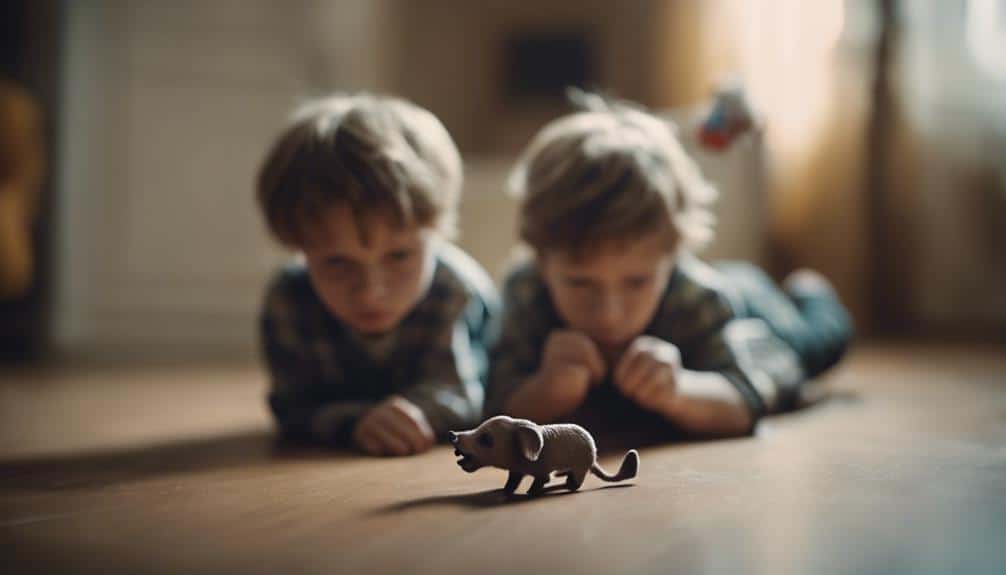
Watching violent scenes in movies or TV shows can affect how you treat your pet, and might even lead to harmful behavior. When we're kids, seeing violence can distort our understanding of how to interact with animals in a healthy way.
One reason this happens is because of imitation. Kids often copy what they see on screen, without realizing they're imitating violent behavior towards animals. Another reason is desensitization. If kids are constantly exposed to violent scenes, they might become less sensitive to the pain and suffering of animals, making it easier for them to hurt animals without feeling bad about it.
When kids are exposed to violence all the time, they might also struggle to understand how animals feel. This lack of empathy can lead to harmful actions towards pets. Lastly, when violence towards animals is shown in media, it can make kids think it's okay to hurt animals. They might think it's normal behavior.
It's crucial for parents or guardians to monitor what kids are watching and teach them the difference between what's real and what's just a movie or TV show. By understanding how media affects our behavior, we can promote healthy and compassionate interactions with animals.
Experimenting Without Awareness of Harm
Kids under 5 might hurt animals without meaning to because they're still learning and don't fully understand that animals can feel pain. They're naturally curious and might do things that accidentally harm animals because they don't know what might happen.
It's important to remember that young kids might harm animals because they don't know better, not because they're trying to be mean. Their brains are still developing and they're still learning about how animals feel.
As they explore and experiment, it's crucial for parents and caregivers to step in and guide them. They need to show kids how to interact with animals gently and respectfully.
Teaching kids about being kind to animals can help prevent accidents during this curious phase. Around 4-5 years old, kids start to develop empathy, so it's especially important to teach them about animal feelings.
This helps them grow into compassionate people who care about animals.
Developing Empathy and Compassion
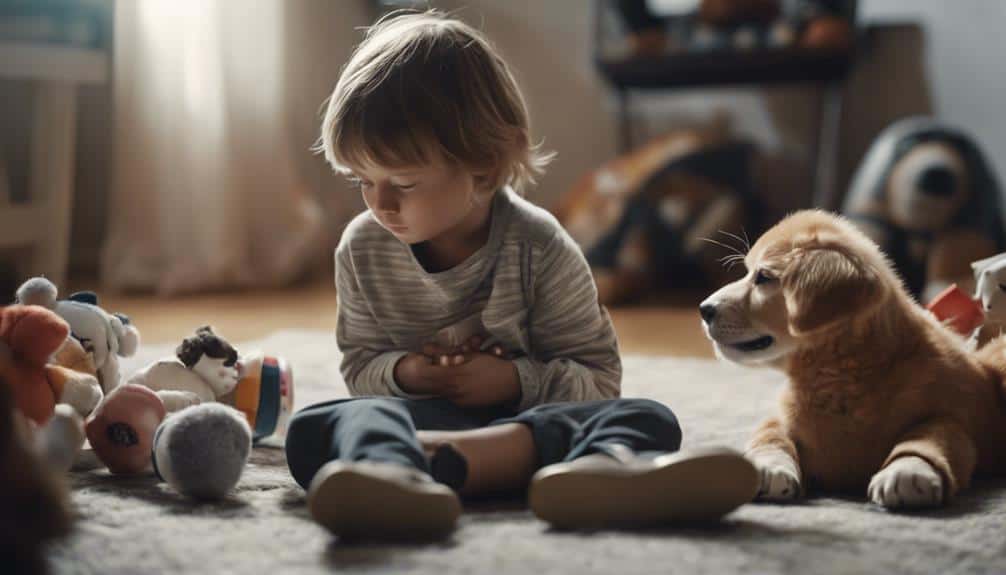
Understanding and acknowledging the emotions of animals is key to developing empathy and compassion. It's a big deal because animals feel things just like we do – happiness, fear, sadness, and more.
By recognizing these emotions, we can start to build a connection with them.
So how do we do that? For starters, we need to practice kindness every day.
It's not just about being nice to animals, but also about understanding their boundaries. You know, what makes them uncomfortable or stressed.
By doing so, we can create a safe and respectful space for them to thrive.
Teaching empathy is a gradual process that starts with awareness and education.
It's about learning to see things from an animal's perspective, rather than just our own.
Building Empathy Skills
Developing empathy and compassion takes practice, patience, and understanding. It's a journey, not a destination.
When you actively listen to others, you're more likely to understand their emotions and perspectives. So, give the speaker your full attention, show empathy through your body language, and reflect on what they're saying. This helps you connect with them on a deeper level.
Put yourself in their shoes and try to see things from their perspective. Understand their emotions and experiences – it's key to building empathy.
When you respond to others, do it with compassion and kindness, even in tough situations. This helps them feel heard and understood.
Small acts of kindness can go a long way in showing empathy and compassion towards others. So, engage in these acts whenever you can – it makes a big difference.
Understanding Animal Emotions
So, you want to understand animal emotions? It's pretty simple: recognize that they've feelings too, just like us. They feel pain, joy, fear, sadness – the whole range. And that's crucial if we want to prevent animal cruelty.
The first step is empathy. Put yourself in their shoes (or paws, or hooves…). Try to imagine how they're feeling in different situations. That's how you build a connection with them and start to care.
Empathy is something you can develop over time. Learning about animal welfare and kindness is a great place to start. It's especially important to teach kids to respect animal boundaries. When you can read their emotions and respond to them, you'll form a deeper bond and be less likely to hurt them accidentally.
Practicing Kindness Daily
Practicing kindness daily is essential to cultivate empathy and compassion towards animals. It's about being conscious of our actions and interactions with our furry friends. Developing empathy towards animals is crucial in preventing cruelty to them and fostering a sense of responsibility and care.
As a parent, you should lead by example and show your kids how to care for and respect animals. This way, you're modeling empathetic behavior and teaching them to do the same.
Teaching kids about animal welfare and kindness helps them understand how their actions affect animals. So, take some time to educate them on this important topic. Engaging children in discussions about animal welfare not only fosters empathy but also encourages them to take responsibility for the well-being of pets and wildlife alike. Activities like feeding rabbits fresh vegetables can be a hands-on way to reinforce these lessons, allowing kids to see the positive impact of their care. By learning to respect and nurture animals, children can grow into compassionate adults who advocate for the humane treatment of all living beings.
It's also essential to teach kids to recognize and respect animal boundaries. This helps create a safe and understanding environment for both the child and the animal.
Lastly, have open discussions with your kids about their feelings and kindness towards animals. This helps them develop a deeper understanding and empathy towards our furry companions. By instilling these values early on, you can help your kids develop a lifelong sense of empathy and care towards animals.
Lack of Remorse for Actions
When someone doesn't feel sorry for hurting their pet, it's often because they're not connecting with how their actions affect their pet.
This lack of connection makes it harder for them to understand and care about their pet's feelings and needs.
Take a step back and think about how your actions impact your pet.
Try to develop a deeper understanding and concern for their well-being.
Emotional Disconnect From Consequences
When we hurt a pet, it's crucial to recognize the emotional disconnect that can happen when we don't feel remorse for our actions. As kids, we might've felt cruel or abusive towards animals without realizing how our actions affected their well-being. This disconnect can stem from not understanding how our actions impacted the pet.
So, let's reflect on how our ability to empathize with our pet's pain was hindered back then. We need to understand that our actions had real consequences on the pet's physical and emotional state.
It's also important to explore how our behavior towards animals as kids might've been influenced by external factors or experiences.
To move forward, we need to address this emotional disconnect. Seeking guidance can help us develop a deeper sense of empathy and remorse for our past actions.
This is an essential part of the healing process.
Absence of Empathy Development
So, let's talk about why some kids don't feel bad when they hurt pets. Usually, kids who are mean to animals don't understand how the animals feel. This is because they haven't developed empathy yet. Empathy is when you can put yourself in someone else's shoes and feel what they're feeling.
When kids are really young, under the age of 5, they might not understand that animals can feel pain. That's because the part of their brain that helps them understand other people's feelings, called the prefrontal cortex, is still growing. So, they might not realize that what they're doing is hurting the animal.
Here's a rough guide to how kids develop empathy and what we can do to help them:
| Developmental Stage | Lack of Empathy Impact | Remedial Actions |
|---|---|---|
| Under 5 years old | They don't get that animals feel pain | Teach them about animal welfare |
| 5-10 years old | They're getting it, but need guidance | Guide and educate them on empathy |
It's super important to teach kids about empathy and taking care of animals. This can stop them from being violent towards pets and help them understand that their actions have consequences. If we help kids develop empathy early on, they'll be more likely to feel bad when they've done something wrong and want to be kind to animals.
Need for Proper Guidance
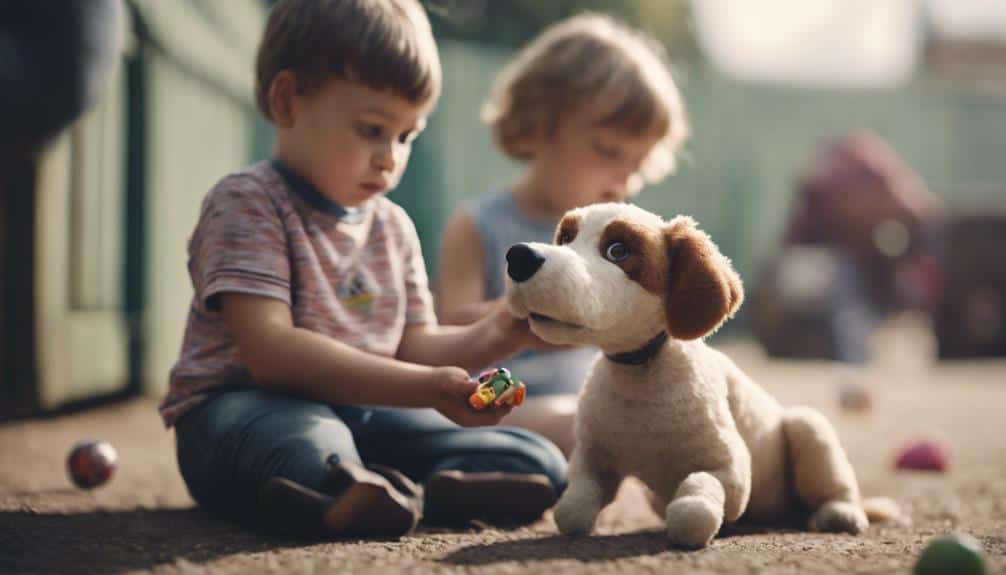
Proper guidance from parents and caregivers is essential in helping children understand the consequences of their actions towards animals and developing empathy. Children may not grasp the impact of their behavior on animals, making it essential for adults to provide the necessary support and education.
So, how can parents and caregivers do this? For starters, setting clear boundaries and consequences can prevent children from being cruel to animals. It's also crucial for parents to model kind and compassionate behavior towards animals to teach children empathy.
Education on animal welfare is fundamental for children to develop empathy and understanding. This means teaching kids about the needs and feelings of animals, and how our actions can affect them.
Lastly, open conversations about feelings and kindness towards animals should be ongoing to reinforce empathy and compassion. This can be as simple as talking to your child about how they think an animal might feel in a given situation, or praising them when they show kindness to an animal.
Conclusion
When you think back on what happened, remember that you were just a kid who didn't know any better. You were still learning about the world and how to be kind to others, including your pet.
Looking back, you can see that you were still figuring things out. You didn't mean to hurt your pet, and you're probably really sorry about what happened.
The good news is that you've grown a lot since then. You've learned more about how to treat living things with kindness and respect.
Your pet has forgiven you, and it's time for you to forgive yourself too.
Keep moving forward, and try to be kind to all living things. You're doing better now, and that's something to be proud of.


